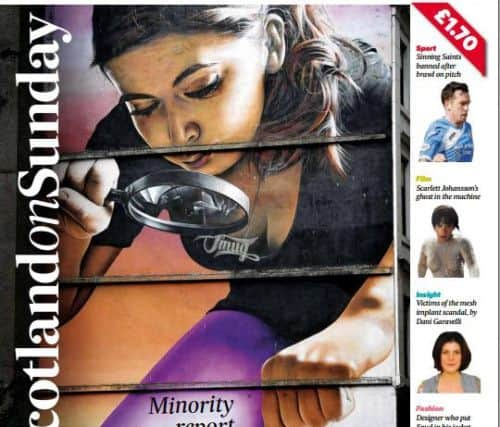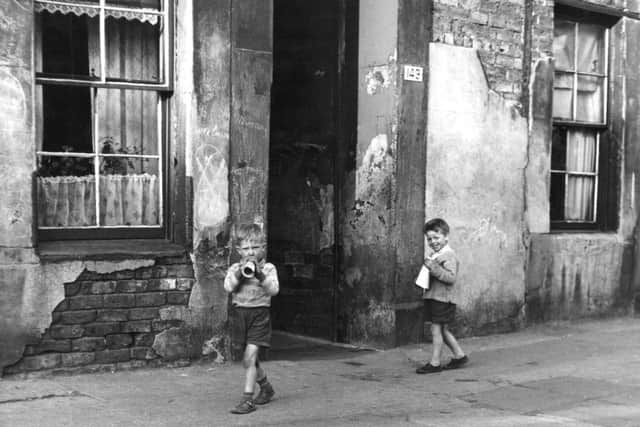Study reveals Scotland's sectarian equality gap


The findings of the newly published research into 400,000 people living in the two countries has surprised academics and others who assumed that the gap between the two denominations would be greater in Northern Ireland.
Yesterday the Catholic Church in Scotland called for more work to be done to narrow the gap identified by the study, which was conducted by experts from Queen’s University Belfast, Ulster University, Edinburgh University and the University of Leicester.
Advertisement
Hide AdAdvertisement
Hide AdWriting in today’s Scotland on Sunday, Duncan Morrow, the Scottish Government’s expert adviser on sectarian issues, calls for Scotland’s equality legislation to be tested and for sectarianism to be included in routine monitoring of inequality.


The study’s authors suggest the situation in Scotland may have arisen because it does not have specific legislation to tackle religious inequality which was introduced in Northern Ireland in an attempt to heal the wounds caused by 35 years of sectarian conflict.
Initial analysis of the data found that, in Scotland, Catholic men are 39 per cent more likely to die between the ages of 25 and 74 than Protestants. When the data was adjusted to take into account the effect that socio-economic status has on death rates, that figure was revised downwards to 14 per cent.
When it came to Scottish women, Catholics were 29 per cent more likely to die between the ages of 25 and 74 than Protestants – a figure that came down to 12 per cent when adjusted for socio-economic status.
This contrasted with the Northern Irish situation where Protestant men were nearly 5 per cent more likely to die aged between 25 and 74 than Catholics when the figures were adjusted for socio-economic status.


Similarly, Protestant women were about 1 per cent more likely to die aged between 25 and 74 than Catholics.
“Yes, we were surprised by the findings,” admitted David Wright, the lead author of the study from Queen’s University. “Normally if you want to find a story about religion then you come to Northern Ireland, where we knew we would find a difference. But we didn’t really expect to find it in Scotland.”
When it came to the economic fortunes of inhabitants of the two countries, the study found that Scottish Catholics were at a disadvantage to Protestants as well as their equivalents in Ulster.
Advertisement
Hide AdAdvertisement
Hide AdThe study, which has just been published in the Health & Place journal, found that 20.9 per cent of Scottish Catholics were in the professional class compared with 27.1 per cent of Northern Irish Catholics. When it came to long-term unemployed, 10.2 per cent of Scottish Catholics were in that category compared with 8.6 per cent of Northern Irish Catholics.


On education, just 14.2 per cent of Scottish Catholics had a degree, compared with 16.7 per cent of Scottish Protestants, 17 per cent of Northern Irish Catholics and 15.3 per cent of Northern Irish Protestants.
Car ownership was another category where a gap was observed: 35.7 per cent of Scottish Catholics did not have a car, compared with 32 per cent of Scottish Protestants. In Northern Ireland, only 17 per cent of Catholics did not have a car and 12.8 per cent of Northern Irish Protestants were without a vehicle.
A similar trend was observed when it came to property ownership, with 66.2 per cent of Scottish Catholics in owner-occupied homes compared with 74.2 per cent of Scottish Protestants. More Northern Irish Catholics owned their own home (77.6 per cent) – a status enjoyed by 81.6 per cent of Northern Irish Protestants.
The study used a sample of 156,448 Scots and 248,255 people from Northern Ireland aged between 25 and 74 during the 2001 census. They were observed during a follow-up period of nearly seven years. Sixteen per cent of the Scottish sample were Catholics, compared with 38 per cent of the Northern Irish sample.


“It is the most up-to-date data and it is the only study that has tried to do this at this level – using data from the whole of Scotland and the whole of Northern Ireland,” said study co-author Michael Rosato.
One explanation for disadvantaged Scottish Catholics offered by the study is that there has been “insufficient time” to overcome the challenges posed by Irish immigration to Scotland in the 1840s.
It also asks if it could be down to discriminatory employment practices, as well as a lack of explicit equality legislation as seen in Northern Ireland.
Advertisement
Hide AdAdvertisement
Hide AdThe 1998 Good Friday Agreement spawned an Equality Commission which has undertaken numerous initiatives in an attempt to close the religious divide.
The study concluded: “In Scotland, Catholics remain at greater socio-economic disadvantage relative to Protestants than in Northern Ireland and are also at mortality disadvantage. These disadvantages may result from sectarian discrimination acting on a much smaller minority group that is without the protection of the well-established anti-discrimination legislation enacted in Northern Ireland.”
Yesterday a spokesman for the Catholic Church said the findings suggested further research would be worthwhile. Shortly afterwards the Catholic Church issued a joint statement with the Church of Scotland.
“The Catholic Church in Scotland and the Church of Scotland have a strong track record of working together to improve life for everyone living in Scotland,” the statement said.
“In 2005, our two churches came together to form the charity Faith in Community Scotland, whose purpose is to encourage and work alongside people in Scotland’s economically poorest neighbourhoods. Sadly Scottish life expectancy remains the lowest in the UK.
“As churches we share the belief that structural injustice and the refusal to share wealth fairly are the root causes of poverty. We share a commitment to working towards a fairer, juster society.
“We also believe that the strength and potential of people struggling against poverty is a cause for hope and optimism.
“Sectarianism has no place in Scotland today and we support efforts such as the In Wi’ the Mix initiative that bring faith groups together to tackle difficult issues within their communities.”
Advertisement
Hide AdAdvertisement
Hide AdA Scottish Government spokesman said: “Any form of discrimination is completely unacceptable.
“We are committed to tackling any form of sectarianism and are clear that everyone in Scotland must be empowered to achieve their potential, irrespective of faith, gender, race or sexuality.”